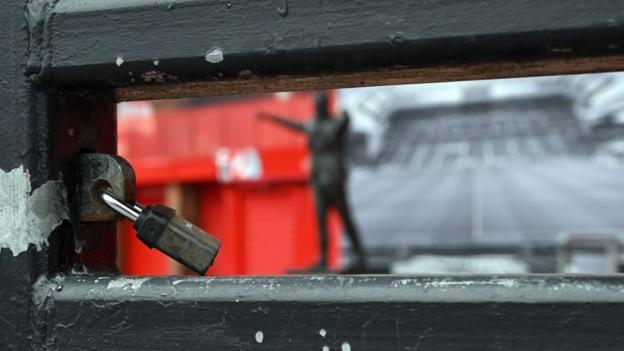Media playback is not supported on this device
When Premier League club executives link up for a crucial video conference call on Friday they will do so amid unprecedented pressure, and mounting unease.
The tension surrounds not only how the plan to resume the football season behind closed doors at a small number of sealed and approved venues should develop, but whether it is realistic, responsible or indeed appropriate to pursue it at all.
The sense is that hopes of a return to action by early June now hang by a thread.
Confidence has undoubtedly been shaken by the French government’s decision to put elite sport on hold until September, along with the warnings of medical experts and player representatives about the health risks of rushing back into action.
Some clubs are worried the sporting integrity of the competition could be compromised if only certain venues are used and they play fewer games at their home ground than their rivals. Others say they feel pressured into agreeing to play by politicians and league bosses when they would prefer the season to be abandoned.
- Matches at original venues ‘present challenges’ to emergency services
- La Liga plans training return as soon as possible
Privately, the mood within both the Premier League and in Whitehall suggests cautious optimism remains.
And there are some reasons for positivity too. Political leaders in Switzerland, for instance, have announced that the country’s Super League will “probably” resume on 8 June if there’s no worsening of the outbreak. Uefa’s medical chief Professor Tim Meyer, meanwhile, has said it is “definitely possible” to plan for the suspended 2019-20 season to restart. Read into that what you will.
But by the time Friday’s Premier League meeting takes place, is there a real danger that Project Restart could have suffered a false start?
The clubs know that, ultimately, they will take their lead from government, and their medical and scientific experts. That was proved by what happened across the Channel, where the French league’s modelling and scenario planning was suddenly rendered meaningless when Prime Minister Edouard Philippe made his shock announcement, and the season was abruptly cancelled, as it has been in the Netherlands and Belgium.
Government approval in the UK relies on key criteria such as improved testing capacity, and a relaxation of social distancing rules being met.
But ministers and their advisers will also be hanging on Angela Merkel’s every word on Thursday when the German chancellor addresses regional leaders, and no doubt discusses the Bundesliga’s plans to resume matches in mid-May – plans that have acted as a source of inspiration to other countries around Europe.
But with a recent spike in cases in Germany raising fears that their lockdown may be tightened again, if Merkel follows the French in ruling sport out for several months, some believe the game could be up for the Premier League too.
Media playback is not supported on this device
How realistic would it be, after all, that Germany, which has suffered far fewer cases and deaths from coronavirus than the UK, and has conducted many more tests, could deem sport too dangerous, but that conclusion not be reached here?
Let us not forget that Wednesday’s government briefing brought the news of another 765 deaths in the UK.
And with so much scrutiny of whether the British government was too slow to shut sport down last month, and whether events like the Cheltenham Festival and Liverpool’s Champions League fixture against Atletico Madrid at Anfield are linked to the numbers of local cases, the UK would surely not want to be an outlier.
This time last week, amid growing anxiety over the apparent financial crisis that abandoning the season would trigger, the Premier League’s hopes of a return to action were beginning to fade.
But then, with frustration growing among some executives at what they saw as a lack of guidance from government, suddenly came encouragement.
With Prime Minister Boris Johnson preparing to return to work after recuperating from his own brush with coronavirus, the league was told Downing Street wanted top-flight football back as soon as possible, to help boost people’s morale after months in lockdown, and to support the game commercially, with many jobs on the line and the wider football industry desperate for a restart.
Premier League bosses had let it be known just how important it was that the season be completed, pointing to the three-quarters of a billion pounds that contractually would have to be paid back to live TV rights-holders Sky and BT.
Whether the two broadcasters actually intend to demand all of the refund they are entitled to if the season cannot resume remains unclear. I understand they are considering asking to show more matches next year, or requesting a year’s free extension to their current deal to mitigate the damage their businesses have suffered. But some kind of compensation will almost certainly have to be paid.
Last weekend BBC Sport revealed that football’s senior medical experts, along with their counterparts in rugby, racing and cricket, were to be invited to a series of virtual meetings, in what was described to me as a “quickening of the pace” in preparations for a resumption.
Ministers continued to make supportive statements to the media and in parliament. A number of clubs reopened their training grounds for restricted use by their players. Premier League club doctors held a meeting of their own to discuss hygiene standards and proposed twice-weekly testing of players. Clubs were asked to consider the concept of playing in sealed, neutral venues. Broadcasters have been told to work out the minimum numbers of staff they would need at matches.
But major questions still need to be answered if professional sport is to get back on the pitch any time soon, while avoiding damaging headlines.
How do football and other major sports avoid being a drain on an under-strain NHS if athletes are injured and need an ambulance or hospital treatment?
How acceptable is it that highly paid stars have access to tests while members of the public are struggling to get them, even if the sporting tests are being funded privately?
And what if fans gather outside stadiums or elsewhere to celebrate, with the pressure on policing that would inevitably involve?
Is it right that more effort is made by the government to help a few of the professional sports get back up and running before less wealthy, publicly funded Olympic and Paralympic sports, along with grassroots sport?
After the controversial furloughing of staff by some clubs, an unseemly row with players over proposed wage cuts, and some regrettable failures to uphold social distancing rules by some teams, football can ill-afford more blows to its reputation.
Exactly seven weeks ago the Premier League found itself in a similar position to the precarious one it faces now. With sports event across the world shutting down or going behind closed doors, it defiantly pressed on, issuing a statement insisting that the following weekend’s fixtures would go ahead as planned.
Accused of poor judgement, less than an hour later it was forced into announcing an emergency meeting when Arsenal revealed coach Mikel Arteta had contracted coronavirus. No football matches have been played since.
On that occasion, with the government still insisting it was safe for such events to continue, the Premier League and other sports authorities were left to reach their own conclusions.
But several weeks on, much has changed, and the stakes have become even higher. And this time, one suspects the decision will be taken out of football’s hands.





